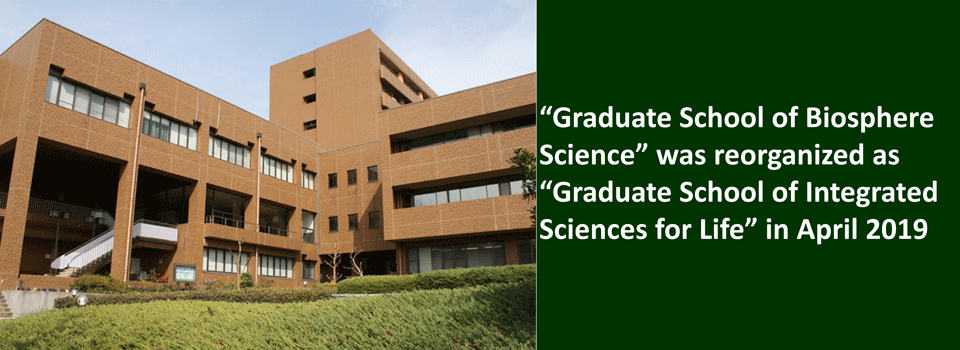Molecular and Applied Biosciences Division
The molecular and applied biosciences program provides course work and conducts research to analyze and evaluate the various biofunctions of microorganisms, plants and animals at the molecular and cellular levels, in addition to individual and ecological perspectives. The aim of this program is to utilize biofunctions effectively, searching for novel natural compounds and functional proteins, analyzing the structure of bioactive substances, creating novel bioresources, and molecular breeding for food production and designing environmental detoxification systems using immunological, ecological, and gene cell engineering techniques, as well as the tools of molecular biology, organic chemistry and biochemistry. Furthermore, the purpose of this program is also to provide educational and research programs to develop new biotechnologies, through isolating bioactive substances designed to prevent lifestyle-related diseases such as cancer, evaluating the deleterious effects of endocrine-disrupting chemicals, and investigating the biological mechanism to produce bioactive substances.
<Subjects>
Immunobiology / Enzyme Chemistry / Microbial Biochemistry / Ecological Biochemistry / Biological Chemistry
Food Science and Biofunctions Division
The development of food resource is directed toward the search for new, potential organisms and natural products as well as the clarification of their functions and mechanisms. In the perspective of Ishoku-Dogen (Food as Medicine), the nutritive, sensory, and assimilative properties of foods are analyzed and evaluated. The mechanisms by which an organism produces useful bioactive substances as food and natural product sources are also elucidated. Food physical properties are studied in order to manufacture products with superior sensory qualities and nutritive values. Novel food processing methodologies are developed for application to underexploited resources. Moreover, innovative techniques and microbial resources for brewing technology are developed. The manufacture and development of safe and healthy food resources are also studied through the investigation of food-poisoning bacteria, determination of new pathogenic factors in microorganisms, and identification of allergenic substances. Researches on the distribution and accumulation mechanism of marine organisms and biotoxins are conducted to ensure the safety of aquatic food resources.
<Subjects>
Marine Bioresource Chemistry / Food Chemistry / Biomolecular Physical Chemistry / Food Engineering / Food Microbiology and Hygiene / Molecular Nutrition / Brewing Science and Technology


 Home
Home
